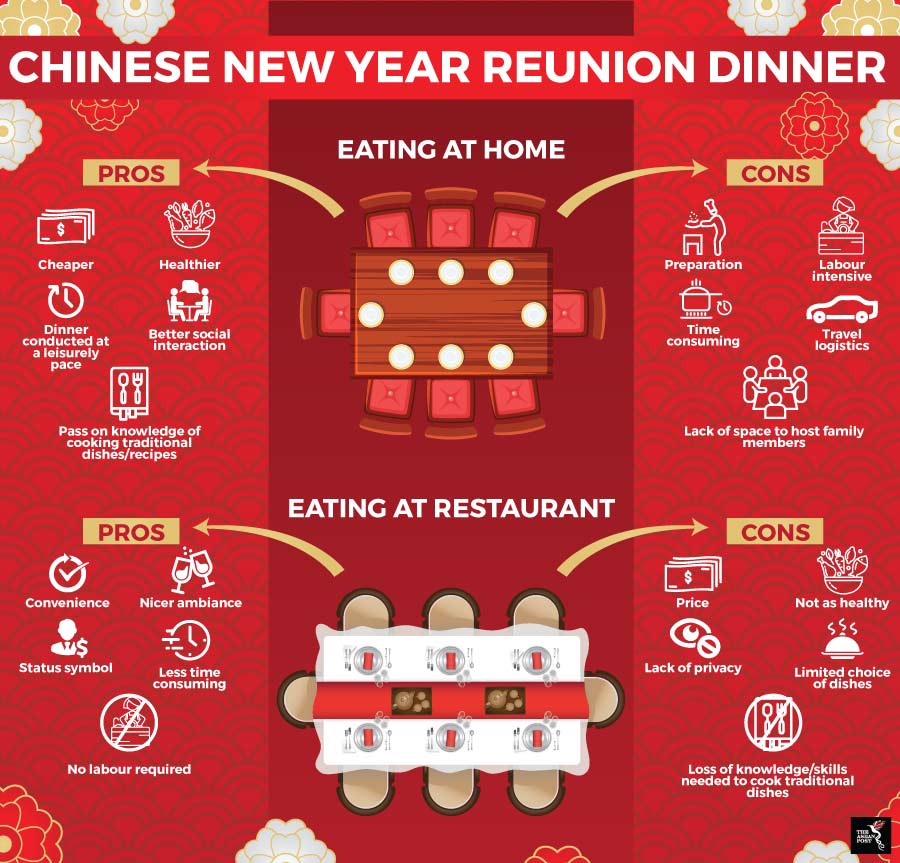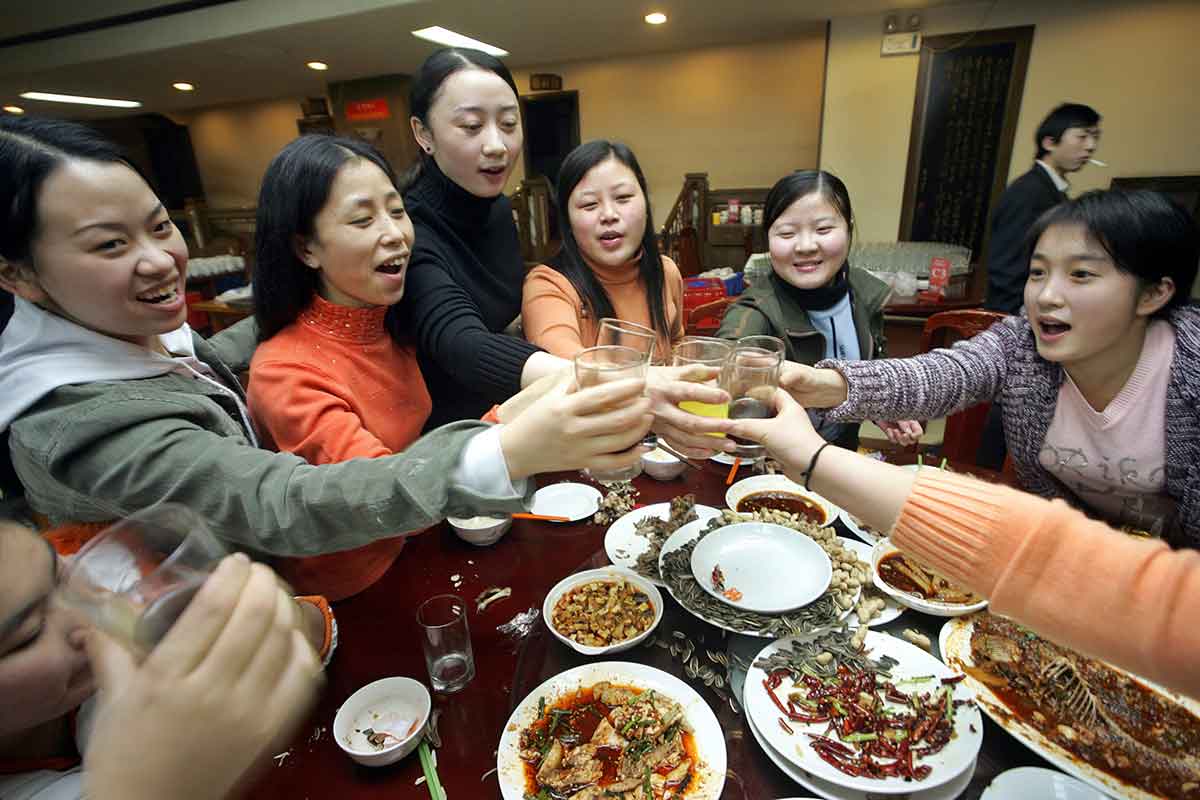With the Chinese Lunar New Year just around the corner, many in the region will be looking forward to meeting up with their extended family from near and far for the traditional reunion dinner.
The lavish meal, held on the eve of the Chinese Lunar New Year, is an important cultural event for the Chinese community – particularly related to reunification and paying homage to family and ancestors.
Southeast Asia is home to an estimated 30 million ethnic Chinese, and the reunion dinner will gather many of them around the dinner table for the once-a-year dinner which is usually held in the patriarch’s house.
But as traditional values slowly erode or become less significant, it is only inevitable that the reunion dinner – while still highly significant – would go through a transformation of its own.
Some families choose to host the auspicious dinner on a rotation basis, some even forgo it for trips abroad, and some choose to have it at a fancy restaurant or luxury hotel.
A growing number of urban families now find it easier to eat out on this special occasion as opposed to preparing an elaborate meal for a multitude of extended family members at home.
Indeed, the hassle of planning, preparing and cooking the spread of symbolic dishes is time-consuming and labour intensive. Combined with rising incomes, many feel that time spent preparing the elaborate dinner could be better spent catching up with family members.
Convenience and a ‘reversed celebration’
According to Adrian Y. T. Yao, Lecturer & Program Coordinator of Malaysia National Subjects at Monash University Malaysia, the trend of eating reunion dinners at restaurants and hotels is inter-related with traveling patterns as well as a change of lifestyle and social status.
“The younger generation may find it hard to travel back to their ancestral homes or villages as logistical issues may prevail,” he said.
“Hence, this causes a ‘reversed celebration’ pattern, whereby the elders or ancestors travel from villages or hometowns to the city to celebrate with their immediate or extended family members, thus creating the need or demand of eating out to avoid the hassle (of cooking at home),” he explained.
Convenience plays a big role in a family’s decision to hold the reunion dinner at restaurants, especially with less people cooking at home due to busy lifestyles or a lack of culinary skills.
“Preparing the reunion dinner can be quite a chore for most modern families,” noted Chua Guan Cheong, a China analyst based in Singapore.
“People seldom cook at home nowadays – especially for such big occasions – so it actually makes more sense for those who cannot handle such ‘major cooking projects’ to (leave it to) those professionals outside.
“While I still continue to have the reunion dinner at home, I can understand why people would choose to eat outside as it can save them quite a bit of time for cleaning up as well,” he added.
Southeast Asia is eating out more
With a growing affluent middle class across the region, increasing number of working mothers and a variety of stalls and restaurants serving relatively cheap food, it is becoming the norm for people to eat out instead of cooking at home.
In Indonesia, the percentage of the public’s expenditure on prepared food and beverages has increased from 29.6 percent in 2016 to 32.7 percent in 2017 and 34 percent in 2018, according to data from Statistics Indonesia.
In Singapore, the Nielsen Out-of-Home Dining Survey conducted last year found that 24 percent of people eat out daily as opposed to 19 percent in 2015.
Meanwhile in Malaysia, a Taylor’s University survey in 2013 found that 64 percent of the 2,000 people approached for the study eat out at least once a day.
How restaurants have adapted
The increase in number of restaurants catering to Chinese Lunar New Year reunion dinners has created competition in the restaurant industry, with restaurants coming up with different packages to suit different needs and budgets. Demand for tables is so great that some restaurants require bookings months in advance.
Restaurants even offer ‘to-go’ signature Chinese Lunar New Year dinners which are delivered to diners’ homes, providing families with a restaurant-quality meal in the comfort of their own dining room.
As part of their ‘value added’ services, some restaurants are now incorporating events such as lion or dragon dance performances, God of Prosperity walkabouts or even fireworks performances as a means to enhance the festive mood. Source:Various
Source:Various
Traditional values, recipes facing extinction
The long-term implications of people choosing to eat reunion dinners in restaurants include inadequate cultural appreciation amongst the younger generations – particularly on the significance and meaning – of the meal.
Increasingly, people are choosing to forgo the reunion dinner for holidays abroad, which “is a sad development in my opinion,” said Chua.
Although eating out offers numerous benefits, eating at home offers more privacy, comfort and intimacy. Diners are not constrained by time and are free to consume their meals at a leisurely pace. In addition, home-cooked meals are relatively healthier and people can choose to cook whatever they want at home – as opposed to having to choose from limited dishes on a menu.
Other long-term effects include the lack of social interaction enjoyed by the different generations helping out in the kitchen and a loss of knowledge and skills required to prepare the traditional dishes.
Despite the commercialisation of the reunion dinner and the many issues it raises, it seems that the trend of eating out for the Chinese Lunar New Year reunion dinner is here to stay.
“The most important thing is having the entire family eating together,” said Chua.
“Whether it is at home or outside does not really erode Chinese values.”
Related articles:
Growing middle class increases Vietnam’s outbound air travel
F&B industry fuelled by middle class
Capitalising on Southeast Asia’s diverse food
